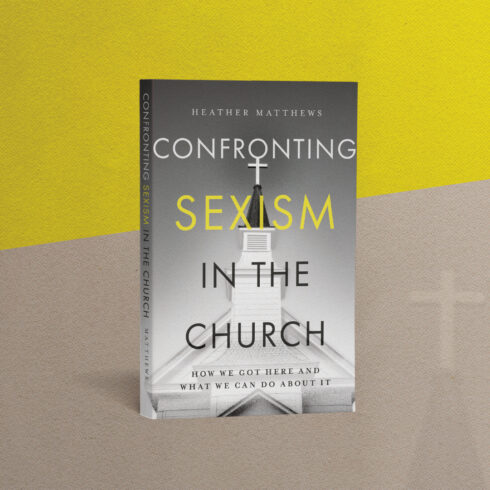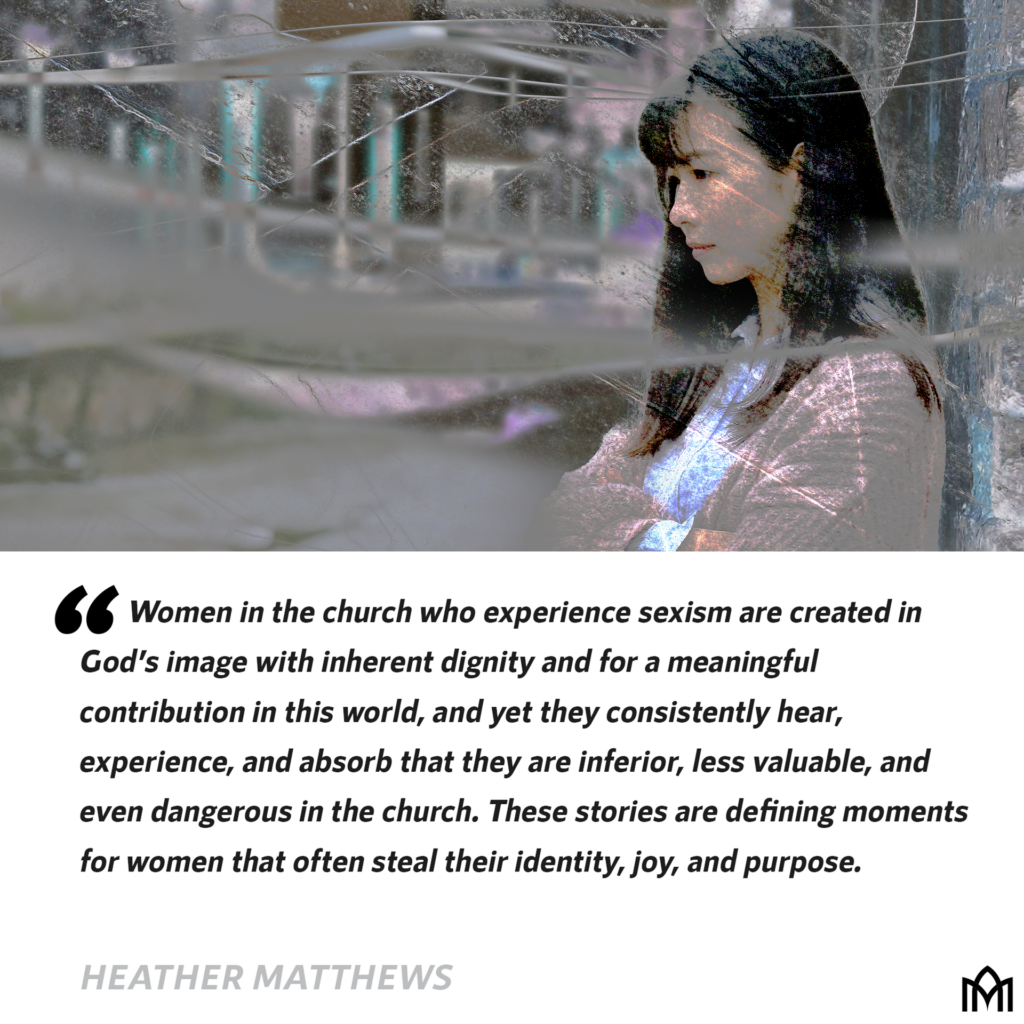Every Woman Has a Story (of Sexism)
Confronting Sexism in the Church, Pt. 1 of 3
*Editorial Note: Confronting Sexism in the Church: How We Got Here and What We Can Do About It, written by Heather Matthews, releases wide tomorrow, August 27th, 2024. Confronting Sexism in the Church is a new release in the ongoing Missio Alliance & IVP Book Series, and we are so expectant in recommending Heather’s book for purchase! ~CK
Sexism is Rampant in the Church
“Why are some women so emotional and b-tchy?,” a young, Christian man asked a friend of mine. My friend told me of her shock because of the sheer sexism and inanity in the question. I logged this story with the many others that I have documented. Since I started writing my book, Confronting Sexism in the Church, I’ve become a collector of stories about sexism both in the broader culture and in Christian contexts. I easily find new stories most days because sexism is everywhere.
Every day, regular women experience sexism. Most stories of sexism are never told, but sexism is so abundant that many stories still regularly make headlines. We’ve seen a significant increase in sexist rhetoric since the recent nomination of a female presidential candidate. This week I also read of women enslaved on sugar plantations in India “who were pushed to have hysterectomies, often as a consequence of routine gynecological problems made worse by an absence of bathrooms, menstrual products and running water in the fields.”1Megha Rajagopalan, “How a Sugar Industry Stamp of Approval Hid Coerced Hysterectomies,” The New York Times, July 30, 2024, sec. World. Accessed at https://www.nytimes.com/2024/07/30/world/asia/sugar-human-rights-bonsucro-india-hysterectomies.html. Stories of sexism are varied, yet ubiquitous.
Sexism is rampant in the church as well. Because of the work that I do now and have done in the past, I have had the privilege of getting to know many amazing women who work in ministry settings both here in the US and around the world. Without fail, every female leader that I know has a story of sexism.
Some women experience egregious sexism like abuse and harassment. Others experience everyday slights and frustrating barriers. Even in the last few weeks, I have heard more stories from more women. These stories are defining moments for women that often steal their identity, joy, and purpose. Women in the church who experience sexism are created in God’s image with inherent dignity and for a meaningful contribution in this world, and yet they consistently hear, experience, and absorb that they are inferior, less valuable, and even dangerous in the church.
Sexism is any belief or practice that diminishes women’s identity as fully and equally created in God’s image.(1/2) Share on X
Sexism restricts women on the basis of their sex from actualizing their full identity by using the gifts and abilities in the church, in the home, and in the world. (2/2) Share on X
Here are but four stories that I’ve heard recently (I have more):
- One young woman told me of how she recently found herself isolated and alone with an unfamiliar Christian male leader who was making her feel uncomfortable and failed to maintain appropriate physical boundaries. She was frightened and unnerved for days because she knew that she could have been assaulted.
- A woman in ministry who is mid-career and at the top of her field in leadership as the director of a non-profit shared that when she was required to take a preaching course for her master’s degree that she struggled with self-doubt and guilt because she had always been told that women shouldn’t preach.
- A good friend of mine, who is a female pastor and is also married to a pastor, told me that she often asks her husband to stay home when she has important ministry engagements because when he is with her, people naturally defer to him and see him as the leader and pastoral authority even though she holds the higher position of leadership.
- I met with a group of women who are leaders, working in ministry, and concurrently pursuing theological higher education so that they can be better equipped for their work in ministry. Every woman had a story of sexism. One woman was in tears because of the way she was treated by her male, pastor colleagues. Another told of how she wasn’t allowed to participate in baptisms. Another woman told me of how she and her husband had been slowly working for years to open more opportunities for women in their church but lamented that that the process was slow and there was still so much resistance. Almost all of these female leaders served in churches where there were limitations placed on them that restrained what they could do and positions they could hold.
I’m always amazed by the sheer number and severity of the stories that I hear from women. Some of the stories are truly astonishing, heartbreaking, and incredibly damaging to women. At the same time, I’m never surprised anymore because I hear these kinds of stories every time I talk to women. It only takes a slight prompt and a feeling of safety for women to start sharing their experiences of sexism. We still live in a world with sexism where women are physically and emotionally unsafe, where people stereotype women, use their power to harm women, and limit women’s agency.
This is sexism.
Sexism is any belief or practice that diminishes women’s identity as fully and equally created in God’s image, and restricts women on the basis of their sex from actualizing their full identity by using the gifts and abilities in the church, in the home, and in the world.
Sexism is rampant in the church. Without fail, every female leader that I know has a story of sexism. These stories are defining moments for women that often steal their identity, joy, and purpose. (1/2) Share on X
Women in the church who experience sexism are created in God’s image with inherent dignity and for a meaningful contribution in this world, and yet they consistently absorb that they are inferior, less valuable, and dangerous. (2/2) Share on X
Women’s Stories of Sexism Matter to God
While all women experience sexism in our world, women in ministry leadership experience significant sexism because they are breaking traditional gender norms for women in the church and attempting to lead in traditionally male dominated spaces where many hold a theological view that doesn’t support women’s leadership.
Women don’t report their experiences of sexism for a variety of reasons. Women often are not believed, or their stories are discounted, minimized, or excused. They are accused of being reactive or emotional or divisive. Often there is little recourse when women experience sexism, and women who report sexism often experience backlash. People in positions of authority do not take action after reported incidences of sexism, or there are no structures of accountability. The church both in recent years and historically has been more interested in keeping women in their place than truly understanding the sexism that women experience and proactively creating environments in the church where women are safe and can flourish.
The most heartbreaking part is to look at the pain in the eyes of the women who tell me these stories. They have truly suffered simply for being women. Most of the time women don’t show this pain, but it doesn’t mean that it’s not there, hiding just below the surface causing lasting effects. Most women don’t have any other option except to bury the pain while moving forward in strength and perseverance. As a result, women also often feel alone, discouraged, and lacking confidence in their gifts and abilities.
Women’s stories of sexism matter to God. The Bible tells women’s stories in great detail. They are not only seen and valued but also redeemed by God. Our God is the one who sees Hagar’s and Bathsheba’s suffering. He calls Tamar righteous. God uses and elevates women like Esther and Deborah. Jesus embodies this same care for women’s experiences in the New Testament. He hears the stories of women, believes women, carries their pain, protects, heals, and frees women. Jesus listened to the story of the woman at the well in John 4. He showed that women’s stories should be believed when he allowed women to be the first witnesses of the resurrection. Jesus shared in Mary and Martha’s pain and sadness and comforted them in John 11 when Lazarus died. He protected the woman caught in adultery by the Pharisees in John 8. Jesus healed the bleeding woman and the daughter of Jarius in Mark 5. He freed Mary from her traditional role to be his disciple in Luke 10.
The leader who shared that she was once afraid to preach had a mentor that encouraged her to use the gifts that God has given her for the benefit of the church. As a result, she is now confident in her calling, unapologetic in her role as a leader, and considering further study so that she can advocate for other women. The stories of women matter, and we must begin to listen. Stories of sexism in the church should grieve us, lead us to lament, and move us to act. We must desire to bring healing into the world that is still marked by sexism so that women in the church will have new of stories of freedom and flourishing.
///
Women in ministry leadership experience significant sexism because they are breaking traditional gender norms in the church, attempting to lead in traditionally male dominated spaces that often don't support women’s leadership. (1/2) Share on X
The stories of women matter, and we must begin to listen. We must desire to bring healing into the world that is still marked by sexism so that women in the church will have new of stories of freedom and flourishing. (2/2) Share on X
*Editorial Note: If you’d like to read an excerpt of Heather’s new book, Confronting Sexism in the Church, the first chapter is available for download here: Naming the Problem (Ch. 1, Confronting Sexism in the Church) | Heather Matthews. ~CK





